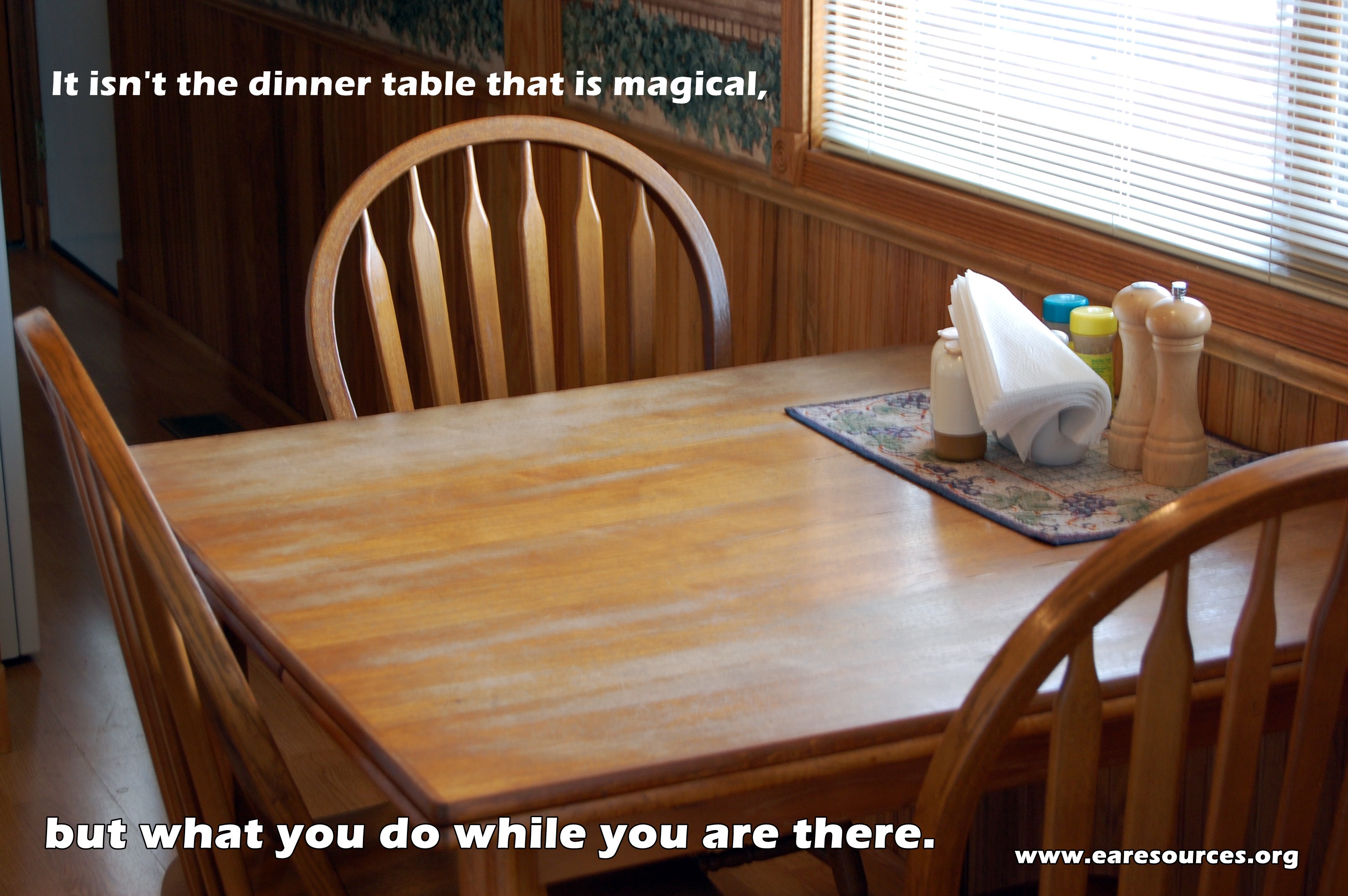
Author Archives: G. David Boyd
Quality Time with the Parents
![sessums-mother-daughter-679867-h[1]](http://www.earesources.org/wp-content/uploads/2013/12/sessums-mother-daughter-679867-h1-300x271.jpg) Just because you have graduated from school does not mean that you no longer need your parents. Our need for a community is a basic human need, and not something you ever outgrow. In an attempt to become independent, sometimes EA’s make the mistake of becoming too distant from their parents. While you do need to become more autonomous, it is okay for your parents to remain apart of your community.
Just because you have graduated from school does not mean that you no longer need your parents. Our need for a community is a basic human need, and not something you ever outgrow. In an attempt to become independent, sometimes EA’s make the mistake of becoming too distant from their parents. While you do need to become more autonomous, it is okay for your parents to remain apart of your community.
Due to the quantities of issues and decisions that you are facing, you need quality time with your parents (or other older adults who you can trust). While each person’s quality time will look different, here are a few ways to make the most of your time with your parents.
Make sure your time with them is…
1. Focused
Quality time is difficult to achieve when interrupted by the constant demand of media. While at a restaurant, I saw all four members of a family eating lunch with their phones out playing games, texting, and surfing the web, rather than being present with one another. So many times families sit in the same room, but are in different worlds. While media and technology can be a blessing, they can also be a curse. Make sure you are fully present when talking to your parents.
2. Two-sided
Emerging adults often get stereotyped as being self-centered (which is not fair because all people are naturally self-centered – I know that I am.) As you mature, your relationship with your parents should develop into a two-sided relationship (a relationship where both parties equally give and receive).
The view of your parents which has only seen their role as your mother and father should be changing. They are not simply parents, but have other roles as a brother, son, employee, community volunteer, church member. As you get to know your parents as adults, ask them questions about their lives, their work, and how they feel. Your parents have good and hard days. They have struggles and disappointments. As an adult, make sure you invest in this new phase of relationship with your parents.
3. Unhurried
College life can be filled with activity. While you might have bonding moments amidst the busyness of life, quality time flourishes when not rushed. When we rush through life, we don’t have time to truly appreciate it, or allow time for reflection. Don’t just call mom and dad while walking between classes, or running between events. Time with your parents is not something you do in between events, but is an event. Schedule a time, and prioritize it.
Quality time is it is often unappreciated. We often don’t appreciate the quality time we have with each other until sickness or death threatens to take it away.
Finding quality time with your parents isn’t always easy. Since you have left home, their lives have continued on. In order to get enough attention, you will need to work for it. You will need to ask for it. You may need to demand it. A basic building block of a strong relationship is feeling wanted. Many parent/child relationships fall apart during the college years because children give signs that they don’t want their parents. Do you parents know that you don’t want money, but that above all you want a relationship with them?
Instead of a text, find some time today to talk to one of your parents.
Dr. G. David Boyd has been a pastor and friend to EA’s for the past twelve years. He still enjoys spending quality time with his parents who live in Indiana.
6 Marks of Quality Time
We often hear the expression quality time, but what exactly does that mean. While I cannot define what that means for you and your family. Here are a few ways to see how much of your time is quality time. Continue reading
Thanksgiving Sucks.
 No, I’m not talking about the weight I gain in the weeks surrounding the holidays. I’m not upset because my team lost. I am not referring to my relatives who although I love dearly, always seem to say something to set me off. I am not really talking about the holiday and all its fanfare at all. Continue reading
No, I’m not talking about the weight I gain in the weeks surrounding the holidays. I’m not upset because my team lost. I am not referring to my relatives who although I love dearly, always seem to say something to set me off. I am not really talking about the holiday and all its fanfare at all. Continue reading
One way to spend your Thanksgiving away from Home
 Lots of people have thanksgiving traditions, like having family over, playing games, watching football and eating too much, the list can go on and on. Traditions are about comfort and doing what you have been doing most of your life, because it’s familiar. There is nothing wrong with wanting to do the same thing year after year but last year opened my eyes to a new tradition.
Lots of people have thanksgiving traditions, like having family over, playing games, watching football and eating too much, the list can go on and on. Traditions are about comfort and doing what you have been doing most of your life, because it’s familiar. There is nothing wrong with wanting to do the same thing year after year but last year opened my eyes to a new tradition.
During the fall of my senior year of college I studied in Nashville, TN. It is a 15 hour drive from my home in MN. I still had some time left after Thanksgiving until the semester was over and I did not have money to drive all the way home and all the way back…and all the way home again.
So I went through some options in my head
A) Spend thanksgiving alone with a frozen pizza and an action movie (not bad but kinda lonely)
B) Beg some people fly out here (I’m in college, all my friends are just as poor as me)
C) See if anyone would let me come to their thanksgiving (I have only known these people for a couple months)
As it turns out one of my buddies lived in South Carolina and was driving home to be with his family, he invited me to come over and I thought it would be a great time! I was a little nervous. I was going to spend Thanksgiving with another family – a family that homeschooled their kids? It was different than my background, and they might have other weird family traditions!
God has a way of taking you places you never thought you would be with people you never thought you would meet. Then afterwards, you can’t imagine your life without it. One of my life verses is Proverbs 3:4-5 “Trust in the Lord with all your heart and lean not on your own understanding.”
Last year’s Thanksgiving was a blast. I was totally brought into this family and they welcomed me with open arms the whole time I was there. Because of their love, I want to start a new tradition for this time of year.
Spend Thanksgiving with a different family each year.
This year I’m going to Buffalo, NY (Lord Willing), to be with different friends.
What’s a tradition that you can start that will stretch your comfort zone?
 Keagan Blancke is a 22 year old broadcasting graduate from University of Northwestern St. Paul. My motto is “it’s all about who you know” and the most important person you can know is Jesus. I would love to get to know you as well, making connections is always beneficial.
Keagan Blancke is a 22 year old broadcasting graduate from University of Northwestern St. Paul. My motto is “it’s all about who you know” and the most important person you can know is Jesus. I would love to get to know you as well, making connections is always beneficial.
5 Ways to Pray For Your Emerging Adult
 When as a parent you are not sure what to do (or not do), or how to help your emerging adult, there is one thing that you can always do without getting trouble – PRAY.
When as a parent you are not sure what to do (or not do), or how to help your emerging adult, there is one thing that you can always do without getting trouble – PRAY.
I grew up hearing stories of parents and grandparents who were prayer warriors. People who would spend hours beseeching God on behalf of others. I hope these “prayer warriors” still exist today.
It is not a small resource to parents. But as one parent said, “Prayer is the only REAL resource we possess. Everything else we use to ‘solve’ our problems (money, influence, talents, etc.) is nothing compared to the power we have in the God of the universe.”
Are you praying regularly for your child? Not just positive thoughts that are sent their way. Not just a regularly rehearsed of words uttered quickly before a prayer. Do you spend time going before the throne of God on behalf of your children?
Some EA’s know that their parents pray for them. One EA writes, “My parents have always been my biggest prayer warriors, and it means the world to me. As a child, they established a precedent of praying about anything -both big (family financial issues) and small (finding a missing item).” While others are doubtful, “I would love it if my mom prayed for me…ever. At all. That would be amazing.”
Knowledge of others that regularly pray for them, gives emerging adults confidence and encouragement in their lives. Here are some things that they requested for their parents to pray for.
1. Expectations
“Patience. Always. There are so many new things in life that happens, so patience to wait it out when we want or are waiting on something and contentment when things don’t work how we planned/imagine them being.”
“For God’s will in my life above my own expectations.”
“that I would walk in contentment no matter what is going on around me.”
2. Their Ministry or Service to Others
“Especially our ministry. I would LOVE that.”
3. Decision-making
“I would like prayer about the things happening in my life and decision-making.”
4. Identity Formation
“One thing would be that they would pray I continue to strengthen my identity in Christ and use that as motivation to love others in my day.”
5. Relationships
“To pray God’s will in my life. Specially pray for the chapter of engagement and marriage.”
“I want my parents to be praying that I know Christ more intimately each day, that my marriage would be strong.”
 You took the time to read the article – (which probably took you about 60 seconds). Now take the time to put it into action. Go back through the five topics, and pray for your children. If you don’t know what they are facing in these areas, then make a point to ask them.
You took the time to read the article – (which probably took you about 60 seconds). Now take the time to put it into action. Go back through the five topics, and pray for your children. If you don’t know what they are facing in these areas, then make a point to ask them.
Let your emerging adults know you are praying for them. They can refuse your help, ignore your wishes, and resent your advice, but they cannot stop your prayers.
Prayer is always an option. And just as a reminder, it is the BEST one.
How to Pray for your Parents
When you lay you down to sleep, do you ask God your parents to keep?  Continue reading
Continue reading
How my Parents Aided in my Battle with Depression
 According to the National Institutes of Health, one out of every four emerging adults (between 18-25) will experience depression in some form (some seasonal, short-term, or long-term). In our Facebook world, everyone seems happy and active, but hidden below those pretty profile pics can be a world of hurt and pain.
According to the National Institutes of Health, one out of every four emerging adults (between 18-25) will experience depression in some form (some seasonal, short-term, or long-term). In our Facebook world, everyone seems happy and active, but hidden below those pretty profile pics can be a world of hurt and pain.
When an emerging adult is dealing with depression, they are not the only ones to suffer. Parents carry a great weight of responsibility during the battle. Many wonder what they can do to help.
I recently interviewed an emerging adult about their struggle, and how their parents helped them through their battle with depression. The writer wished to remain anonymous partially because of the stigma that still exists within the church over those who struggle with depression. Unfortunately, the judgement of others leads people to isolate themselves, and aggravate the problem.
I hope this person’s words can encourage you and your emerging adults.
How long have you been struggling with depression?
I’ve been dealing with clinical depression since I was 15 (7 years now). I don’t know what for sure triggered it, but depression does run in the family. The roughest years were when it first started (age 15), my senior year of high school, and the first two years of college.
How did you get better?
A lot of my depression was fed by my high level of perfectionism. If I didn’t meet my expectations, it would cause me to feel down. I finally realized that I couldn’t continue as I was (sophomore year in college at this point) and took some time off school to give myself a break and focus on what I needed. I spent the first three months of my first semester off sitting on my butt and doing absolutely nothing. This was just what I needed – emotional rest, physical rest, spiritual rest. I hadn’t experienced any of that for far too long. During this rest, I saw a therapist, took medication, and had a good support group. These things all contributed to the healing process and I slowly went upwards from there.
How did you parents help in the process?
My parents did their best to educate themselves on depression and tried to be understanding even when they really didn’t understand everything. Over time, they learned that it was ok to not always understand but just to accept what I was feeling was valid and deeply affecting me. They also learned to ask me what I needed from them rather than try to guess – which was the best thing they could do. I knew what I needed, but was unable (or uncomfortable) to ask for it.
They served as an advocate for me in high school when teachers didn’t understand why I wasn’t getting better. My dad researched and then personally called a therapist who wasn’t taking any new clients at the time, and at the end of their conversation she was willing to see me. My parents went to bat for me in the areas that I was too exhausted or felt too hopeless to fight for myself.
 In what ways were your parents NOT helpful? or even hurtful?
In what ways were your parents NOT helpful? or even hurtful?
The hardest part for my parents was that for a long time they didn’t know how to help me, and I know that made them feel so impotent in the face of watching their daughter struggle with so much pain. At times, they would enter the “fix-it” mode, which is the last thing I needed from them. Depression isn’t a problem that has a simple solution and then it’s “fixed.”
Sometimes they would get really frustrated with me when they didn’t understand my lack of motivation and physical energy to do what they thought was a simple task; they just couldn’t empathize, because they hadn’t experienced it. Feeling their frustration and disappointment on top of my own (because I was already beating upon myself) led to many meltdowns. I know now they weren’t so much frustrated with me than at the situation, but I desperately needed steady patience and understanding and grace, because I had none for myself.
What advice would you give to someone who is currently struggling?
1. Know that you’re not alone—far from it!
2. Seek counsel from someone who has struggled successfully with depression; they’re great for understanding exactly what lies you’re telling yourself and helping you hear the truth when you can’t preach it to yourself.
3. See a therapist. I gained the tools I needed to battle the depression and come out healthy on the other side.
4. Try to give yourself grace.
What did you or your parents do that helped you through depression? Please share your thoughts to encourage others.
When Your Child is Depressed
 According to the National Institutes of Health, “One in four emerging adults will experience a depressive episode between the ages of 18-25.” Depression among emerging adults can be caused by economic uncertainty, changes in relationships, seemingly endless decision-making, or any number of other challenges that they face. Some depressive episodes are short-term caused by circumstances (like seasonal depression, or a traumatic break up), while others are long-term.
According to the National Institutes of Health, “One in four emerging adults will experience a depressive episode between the ages of 18-25.” Depression among emerging adults can be caused by economic uncertainty, changes in relationships, seemingly endless decision-making, or any number of other challenges that they face. Some depressive episodes are short-term caused by circumstances (like seasonal depression, or a traumatic break up), while others are long-term.
When depression comes, it does not just affect the child. As a parent, it affects you. If an Emerging adult that you love is suffering with depression, here are a few words of encouragement to help you through.
1. You, as a parent, will experience various emotions.
Don’t be ashamed or shocked by your own struggle over their depression. Watching our children go through pain causes us pain of our own. Here is an example of a parent’s varied emotions when dealing with a child who is depressed. “I worried all of the time. I kept blaming myself. I tried to be in control of things I had no control over. I experienced fear. I experienced God’s presence. I wanted my child to know the peace of God, but I couldn’t make it happen. I felt helpless. I turned off my feelings to be strong for my child (which was very exhausting).” These mixed emotions can play havoc on a parent’s emotional health. As a parent, you will learn to control your own emotions as you listen to theirs.
It is okay to know and admit that you are hurting. Take time to ensure the health of your own emotions so that you are able to give to your child. No one can give without also receiving and being recharged.
2. You begin helping when you stop fixing.
Most parents when they hear about depression rely on a list of solutions so that it can be solved. You might even be reading this article hoping for the perfect solution. However, depression is not easily conquered. One emerging adults said, “At times, my parents would enter the ‘fix-it’ mode, which is the last thing I needed from them. Depression isn’t a problem that has a simple solution.” Seek to end conversations not with a list of action steps, but a hug and simple words of hope like, “We are going to make it through.” Or “I love you.”
One parent shares that, “You can’t FIX them. Don’t take over their lives. Help them make decisions but don’t make decisions for them.” Even during times of depression, it is important for emerging adults to retain their personal autonomy. Taking over their lives could cause emerging adults to revert back to earlier stages of development.
3. Listen to them and learn.
Once leaving the role of fixer and advice giver, a parent can begin to listen. Many times parents struggle with understanding because they are listening only for the reasons their child is struggling (still hoping to fix it.) As a parent, you are listening for how they are feeling, and what they most need from you in the moment. One Emerging adults said, “My parents learned to ask me what I needed from them rather than try to guess – which was the best thing they could do.”
As you listen, you will learn how to better help your child. One parent expresses what she learned during the process, “I learned to listen and ask open ended questions. I learned not to judge. I learned to discern what to look for as in signs they were in trouble. I learned that it’s okay to snoop into their lives to know where they are mentally.” Every child is different, and learning new skills and acquiring new tools is a must.
Many parents feel as if their child is the only one who is struggling. Mental illness is often accompanied by public shame especially in the church where everybody should be happy. This guilt and shame can cause parents to isolate themselves, and not have the support network they needs as parents. One parent says, “Talk. Talk. Talk. Find support. Don’t try to cover it up like it’s some terrible, horrible secret. Your child should NEVER be ashamed of this disease.” Neither should you as a parent. It is not your fault.
If you are like most parents, this is probably not the first or last article that you will read, trying desperately to get information, help, or encouragement for your child. Depression is not a sprint, but more of a distance race. You will make it through, but it is so important that you make sure of your own emotional health while trying to care for your child.
Remain hopeful in our Lord’s great love for you and your child. “Because of His Great love we are not consumed, for his compassions never fail. They are new every morning; Great is His Faithfulness.”
Who defines Manhood in your Home? – Family Emblem

Who would use store deodorants?
Recently, my wife and I had to buy deodorant for our middle child. Although he is young, his armpits just smell terrible. So we had the conversation planned out perfectly, so as to not hurt his feelings, and help him adjust to this new idea.
As soon as we shared the news, he exclaimed. “I’m a man.” My wife and I just sat their confused. Instead of sad about his stench, he accepted the news with great pride as a sign of his being a man. I am not sure where he got this idea, because I sure don’t run around the house proclaiming the manliness of stinky armpits.
In a world where there are many strange ideas about what being a man is all about, I believe it is important for me to define manhood (based on God’s truth, and with God’s direction) for my three future men.
I am a believer in celebrating rites of passage within a family. As my oldest turns ten this spring, I am already planning ahead a first step in his transition from boy to man. A pattern that I appreciate and have chosen to use in my own family comes from Robert Lewis’ book, Raising a Modern-day Knight.
During my years in ministry, I have observed and participated in several rites of passage with young men. One emerging adult spoke about his father’s role in preparing him to be a dad,
My dad played a large role in my transition into being a man. When I left for college, he told me, ‘You’re a man now.’ He trained me. I know that I have his support. He will back me up and give me advice. He was the man in my life, and he has trained me on what to do in order to be a man”.
That is the way I want to lead my sons, so that they will understand what God calls us to be as men. This is not a project that I should do alone, but something I want to do with my wife. Rachel and I did some reflecting together on what we most want for our boys to be, and we set three goals for our little men.
 As a symbol and teaching tool for my family, I asked a friend to sketch a Boyd Family Crest (the uber-talented Allen Nevalainen). My hope is that each of my boys will instill the values that it represents. The swords represent the community that they will need as they journey through life. The rose represents the love that they will demonstrate to others. The cross represents the purpose for their lives. The Greek words on the banner can be translated, “One Lord, One Faith, One Hope.”
As a symbol and teaching tool for my family, I asked a friend to sketch a Boyd Family Crest (the uber-talented Allen Nevalainen). My hope is that each of my boys will instill the values that it represents. The swords represent the community that they will need as they journey through life. The rose represents the love that they will demonstrate to others. The cross represents the purpose for their lives. The Greek words on the banner can be translated, “One Lord, One Faith, One Hope.”
I believe that intentionality is important for raising our boys to become healthy men.
How do you plan to pass along a legacy of authentic manhood? Share a thought for our community.






![girl-woman-hair-1276336-l[1]](http://www.earesources.org/wp-content/uploads/2013/09/girl-woman-hair-1276336-l1-203x300.jpg)